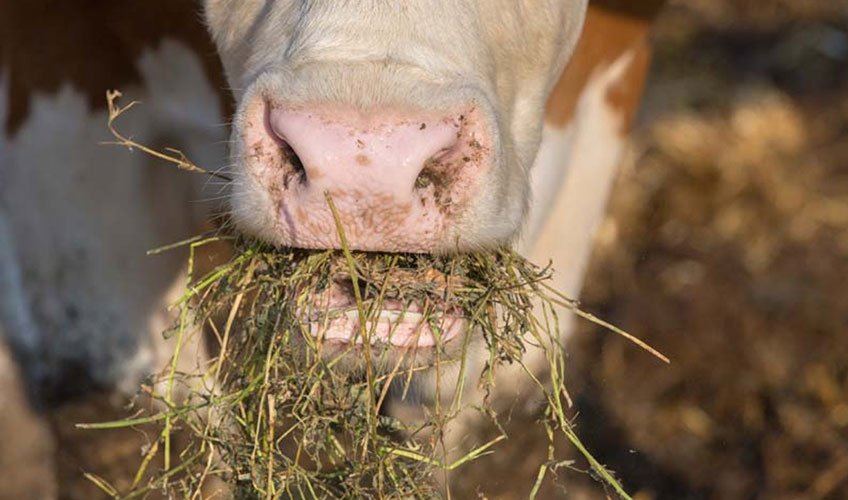Email or call us 01621 773883
Email or call us 01621 773883
Posted on October 8, 2021 and written by Dengie

The rumen operates at an optimum pH of just under 7. The bacteria in the rumen are sensitive to acidity and will not function effectively at a pH below 5.8-6. The cow consuming large quantities of silage at a pH of 4 must do a lot of buffering to achieve a pH of 6-7. To achieve this, the cow produces large amounts of saliva (100-150 litres, which contains up to 3.5kg of bicarbonate) each day.
To produce this amount of saliva, the cow needs to make 30,000-50,000 chewing movements per day, spending an average of 500 minutes per day chewing (20-30 minutes chew time per kg DM). Rumiplus chewing time is 40-80 mins per kg FM. This increase rumen activity and creates more saliva to act as a buffer.
To ensure sufficient chewing takes place, the cow must ingest at least 2-2.5kg of long fibre per day with a length of 3-5cm.
Rumiplus ensures that your cows are provided with a high-quality feed that helps to improve rumination.
Low levels of rumination can reduce the production of saliva, which leads to a build-up of acid in the rumen. This accumulation of acids can result in loss of milk, acidosis, reduced butterfats, laminitis and potentially have a detrimental effect on fertility. Rumiplus encourages the natural rumination process and helps avoid these issues.
It is well documented that a mixed forage diet improves dry matter (DM) intakes and has an effect on milk yield and milk constituents by minimizing nutrient deficiencies and providing a range of energy and protein sources. When formulating diets, it is very important to take into account the structure and level of scratch factor in the diet, particularly in those containing high levels of maize silage, cereals, or wet, acidic grass silages to encourage the cow to ruminate effectively.

The production process of RUMIPLUS preserves all the nutrients of lucerne.
RUMIPLUS provides fibre without reducing density and improves the diet efficiency compared to most other fibre sources, such as straw.

Beta-carotene, as well as being a precursor for Vitamin A, has a role in the synthesis of progesterone and, therefore, can influence the fertility of the cow. It has been shown that cows receiving increased levels of beta-carotene in their diet have a high rate of conception. Rumiplus has much higher levels of beta-carotene compared to other commonly fed forages.
The tables below clearly show the relationship between conception rate and beta-carotene, and the levels available in a Rumiplus diet. The need for extra beta-carotene is even greater when maize silage is included in the diet, which is why the addition of Rumiplus to a cow’s diet can help to increase fertility rates.

The precision dried process to produce Rumiplus, not only removes the water content of the plants, but at the same time, reduces the degradability of the proteins, protecting approximately 50% of the protein for digestion later in the small intestine. This gives Rumiplus a good balance of Rumen Degradable Protein (RDP) and by-pass protein (DUP).

Rumiplus is a natural product and the above figures are given as indicative values only.
For further information click here to contact us and find out what benefits quality lucerne has to offer your cows and dairy goats.